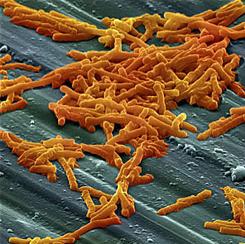
Clostridium difficile, more commonly referred to as C. diff, is a bacteria that makes half a million American’s sick each year, and is responsible for over 25,000 deaths annually, both directly and indirectly. The bacteria can lead to serious illnesses in the gut, that can cause diarrhea and colon inflammation. Often times, C. diff infections can be caused by the over use of antibiotics, which affect the healthy bacteria in the gut and provide opportunity for C. diff bacteria to grow in that area.
Researchers from the University of Michigan, Ann Arbor have received a five-year, $9.2 million grant from the National Institute of Allergy and Infectious Diseases to further study C. diff, to learn more about it with the aim of developing new treatment methods.
University of Michigan researcher and professor Dr. Vincent Young explained that this grant “should help us lay the groundwork for both short- and long-term solutions to the C. difficile crisis, by understanding what puts patients at risk for C. difficile infection, and how we can best protect and cure them.”
The Ann Arbor researchers will be creating computational models to track and better understand the path that the C. diff bacteria takes when infecting the gut, in order for them to be able to predict its movement. The team will create these models using data collected both in their lab and from blood samples and patient records from actual patients with C. diff. The data collected in these models will provide researchers with information about how the natural microbe population in the gut, a patient’s health, and antibiotics all contribute to the cause of C. diff infections.
Through previous research with mice, the University of Michigan researchers have already detailed the life cycle of C. diff in the gut, which has helped them to understand how normal gut bacteria interferes with the C. diff bacteria that can appear in the gut. This knowledge from both humans and mice will help the researchers better understand what risk factors contribute to a patient’s vulnerability to C. diff infections.
